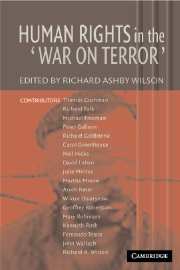Book contents
- Frontmatter
- Contents
- List of Contributors
- Acknowledgements
- HUMAN RIGHTS IN THE ‘WAR ON TERROR’
- Introduction
- 1 Order, Rights and Threats: Terrorism and Global Justice
- 2 Liberal Security
- 3 The Human Rights Case for the War in Iraq: A Consequentialist View
- 4 Human Rights as an Ethics of Power
- 5 How Not to Promote Democracy and Human Rights
- 6 War in Iraq: Not a Humanitarian Intervention
- 7 The Tension between Combating Terrorism and Protecting Civil Liberties
- 8 Fair Trials for Terrorists?
- 9 Nationalizing the Local: Comparative Notes on the Recent Restructuring of Political Space
- 10 The Impact of Counter Terror on the Promotion and Protection of Human Rights: A Global Perspective
- 11 Human Rights: A Descending Spiral
- 12 Eight Fallacies About Liberty and Security
- 13 Our Privacy, Ourselves in the Age of Technological Intrusions
- 14 Are Human Rights Universal in an Age of Terrorism?
- 15 Connecting Human Rights, Human Development, and Human Security
- 16 Human Rights and Civil Society in a New Age of American Exceptionalism
- Index
- References
Introduction
Published online by Cambridge University Press: 18 August 2009
- Frontmatter
- Contents
- List of Contributors
- Acknowledgements
- HUMAN RIGHTS IN THE ‘WAR ON TERROR’
- Introduction
- 1 Order, Rights and Threats: Terrorism and Global Justice
- 2 Liberal Security
- 3 The Human Rights Case for the War in Iraq: A Consequentialist View
- 4 Human Rights as an Ethics of Power
- 5 How Not to Promote Democracy and Human Rights
- 6 War in Iraq: Not a Humanitarian Intervention
- 7 The Tension between Combating Terrorism and Protecting Civil Liberties
- 8 Fair Trials for Terrorists?
- 9 Nationalizing the Local: Comparative Notes on the Recent Restructuring of Political Space
- 10 The Impact of Counter Terror on the Promotion and Protection of Human Rights: A Global Perspective
- 11 Human Rights: A Descending Spiral
- 12 Eight Fallacies About Liberty and Security
- 13 Our Privacy, Ourselves in the Age of Technological Intrusions
- 14 Are Human Rights Universal in an Age of Terrorism?
- 15 Connecting Human Rights, Human Development, and Human Security
- 16 Human Rights and Civil Society in a New Age of American Exceptionalism
- Index
- References
Summary
Introduction
Since the end of the cold war, human rights has become the dominant vocabulary in foreign affairs. The question after September 11 is whether the era of human rights has come and gone.
Michael Ignatieff, New York Times, 5 February 2002The idea of rights is nothing but the concept of virtue applied to the world of politics. By means of the idea of rights men have defined the nature of license and of tyranny … no man can be great without virtue, nor any nation great without respect for rights.
Alexis de Tocqueville, Democracy in America, [1835]1991: 219After the 9/11 attacks and the subsequent ‘war on terror’, have human rights irretrievably lost their status in international affairs and national policy-making? Or, as de Tocqueville declares, must rights always remain a fundamental part of democratic politics since they define the boundary between individual license and government tyranny? There now exists a plethora of books on international affairs after 9/11, too many to cite here, which examine the political fallout of the attacks on the United States and the subsequent U.S. response. Many are concerned with judging the proportionality of the U.S. response to Islamist terrorism, and in particular determining the justness or otherwise of U.S. military interventions in Afghanistan and Iraq.
In this literature, human rights issues such as the treatment of terror suspects may appear in passing, but usually to the extent that they impinge on other, wider political aims, such as holding credible elections in Iraq.
- Type
- Chapter
- Information
- Human Rights in the 'War on Terror' , pp. 1 - 36Publisher: Cambridge University PressPrint publication year: 2005
References
- 4
- Cited by

